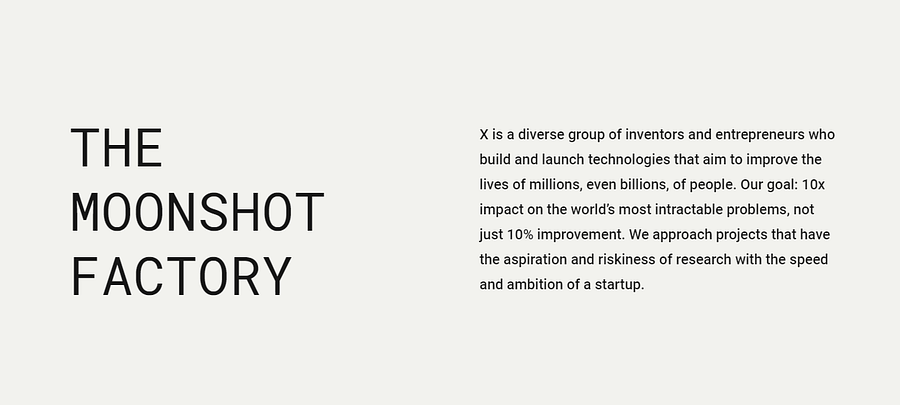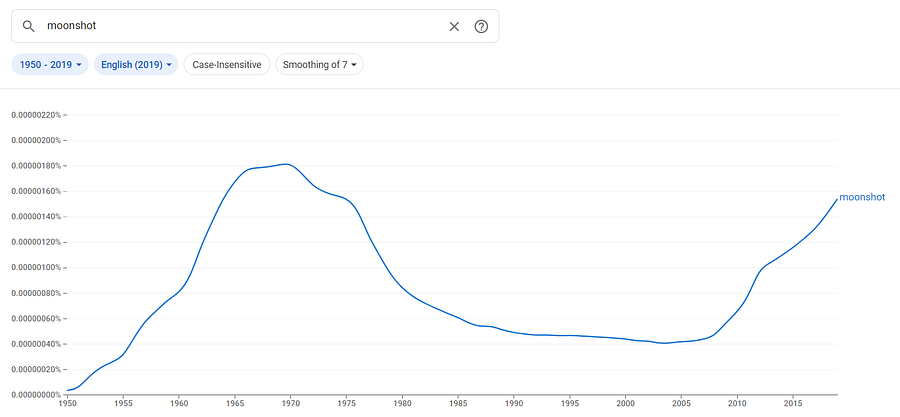Update #1
Friday, August 7th, 2020
As part of the “build in public” model, I’ve committed to sending a weekly update to everyone who signs up for the Magnificent Irrelevance email list.
I’m calling Magnificent Irrelevance “a moonshot”. Why?
There’s a company initially set up by Google in 2010, called X. It’s now a separate company, a subsidiary of Alphabet (the company Google set up to own Google and all the other parts of Google).
X calls itself “The Moonshot Factory”.

It looks like I’m not the only one building some moonshots. Here’s the Google Ngram Viewer. Moonshots — surprise, surprise — got a lot of attention during the lunar voyage days of the late 1960s, but since 2010, no doubt influenced by X’s “moonshot factory”, the word has been making a comeback.

Of course, in the context of “the world’s most intractable problems”, setting up a publication for new sportswriting is definitely not a moonshot.
A magazine or publication for original, longform writing about or related to sports is definitely not going to solve a problem like that. Even if we succeed (“we”, because if this succeeds, it’s going to be a collective effort of readers, writers, editors, subscribers, programmers, project managers and designers), we might do well to have several thousand customers. (I expect to write plenty more about numbers in a future weekly update.)
But I’m still going to describe it as a moonshot.
Not just because I’m trying to do something I’ve never done before. Also because I’m trying to do something I’m not sure can be done. I just don’t know if there’s a market for what I’m hoping to build.
To take one example, the Best American Sports Writing of the Year, a series which produced one of the most treasured books for sportswriters and sports readers, The Best American Sports Writing of the Century, will be no more after its 30th annual edition hits shelves later this year.

So this could all be madness.
But still, it’s worth a shot.
Or to put it another way, it’s worth a moonshot.
Why the name “Magnificent Irrelevance”?
I expect I’m going to get asked this a bit, so there’s a section of the Why page on the website that goes into that in a bit of detail.
Who’s Magnificent Irrelevance for?
All the business books say you need to have “target markets” or “audience segments”.
I’m not one for treating people as targets or segments (or, to use two words common to the world of media, “traffic” or “eyeballs”)
But I do appreciate there’s some wisdom in identifying exactly who you’re doing something for.
So, who’s it for?
I like the way Tim Ferriss has thought about this. In his podcast episode, “Testing the Impossible: 17 Questions That Changed My Life”, Ferriss asked, “could I create a product that would scratch my own itch?”
His thinking is, if he’s guaranteed an audience of one (himself), then perhaps there’s a decent chance there are enough other people out there sufficiently like him to give a business venture a chance.
So for starters, that’s what I’m thinking. But there are other people I’m doing this for.
Right now, there are four sets of people:
- Readers
- Writers
- Editors
- Students
There is inevitably going to be some overlap between these groups, but let’s take each in turn.
Readers
I’ve seen a number of different data-sets about this thing called social media, which has changed everything.
All of them offer some version of the following:
- 1% of people are creators (those who make products, write blogs or articles, create videos or programs or businesses etc.)
- 9% of people are contributors (those who assist in the making, by giving feedback, leaving comments or sharing with their friends, families and networks)
- 90% of people are lurkers (those who see what’s going on, who read, watch and pay attention, but you’d never know it because they don’t ever comment or share or hit “Like”)
Here’s the thing about lurkers.
Lurkers are essential.
If the world seems like it has become more and more navel-gazing, in many ways that’s just a tiny subset of Instagrammers. Most people are too busy with more important things to go all-in on the selfie carousel.
In many ways, readers are the lurkers of the media business. People who take time over an article, who subscribe to their favourite publications, and who keep on coming back as long as they’re getting something valuable.
Without readers, everything is impossible.
So first and foremost, Magnificent Irrelevance will be for readers.
Writers
For readers to have something exceptional to read, we need to foster and encourage writers to keep creating work worth reading.
Media and journalism is increasingly about multiple formats of storytelling, so journalists are encouraged to be broadcasters, and broadcasters are encouraged to write, and data scientists are encouraged to use numbers to tell stories, and everybody has a podcast. (Yes, I do too.)
But I still think there’s room for great writing.
In fact, I think writing is more important than ever.
Without carefully crafted writing, video and audio content is nowhere near as good. Writing is required to make sense of data. Even the least structured podcasts benefit from intro segments that are written and rewritten and recorded and polished.
Writing has been with us for several thousand years, and it’s not going anywhere.
But it seems like in the media world of the 21st century, writers and writing is being squeezed. There are word count limits, and fewer pages, and with slimmer newspapers and less quality, you get fewer subscribers, and with fewer subscribers you have less money to pay writers for quality work, and on and on in a downward spiral of doom.
The days of the staff writer producing a number of pieces for a single publication are probably numbered, but that doesn’t necessarily mean there will be fewer writers.
For many writers, writing is a vocation, not a choice. I hope Magnificent Irrelevance can become a place where writers can publish some of their best work, and be paid for it.
Editors
Maybe even more than writers, editors are an endangered species. Stories of the layers of the editorial process, from managing editors to commissioning editors to copy editors and proofreaders, seem strangely like an anachronism for many people in media now, especially with many media outlets whose business model is a relentless grind of write-publish-write-publish-write-publish.
A number of years ago I was editor of an online publication with a team of six writers alongside me. I was younger and stupider, and there was a pressing need for a steep and immediate injection of “traffic and eyeballs”.
So we played the volume game that everyone else seemed to be playing.
One day I worked it out. We were publishing between 50-100 pieces a day, from 6am until midnight. For me to read them all would take up every minute of my workday, and a few hours of my evening. No time for planning, thinking, talking, meeting or making things better, and certainly no time for actual editing.
But editing is vital.
It’s my wish that editors will have a part of play in the Magnificent Irrelevance journey. Writers hate editors but know they need them.
Gene Weingarten, the Washington Post journalist, finished his brilliant book One Day with the following lines to and about his long-time editor, Tom Shroder:
And finally, there is the awkward matter of Tom Shroder. Tom is my good friend and villainous nemesis. He has been my principle editor at the Post and has edited most of my books. He has the sensitivity of a corduroy condom. (In my columns I have bestowed on him the sobriquet “Tom the Butcher”.) Here is his modus operandi: He will receive my latest chapter, which he knew was written by a man under enormous pressure, in iffy health, fighting personal demons, losing brain cells by the thousands per day, out of time and energy, sapped of will, exhausted by anxiety, defeated by life, pathetically succumbing to it all.
Tom will weigh all these things, carefully consider his human duties to me as a loyal friend, and inform me that I have botched everything and need to have a rewritten chapter to him by Monday at the latest, and it had better address his problems or there will be Hell to Pay.
I absolutely hate Tom and fully intend never to talk to him again — until I need him, which will be soon, because, damn, he is the best.
Students
I remember years ago hearing a statistic that said something like, “There are many more journalism students each year than there are journalism jobs in total“. I’m not sure how true it is any more — as the media industry has tried to stay afloat amid all the Internet disruption, journalism is perhaps less attractive a career choice for school leavers these days.
But still, careers in writing and journalism (and its in-studio or on-camera relatives) are still appealing for tens or maybe hundreds of thousands of students every year.
Why is this?
Maybe because story is so essential to being human.
We want to tell stories, and we want to be told stories.
Stories make sense of the confusion of the world.
So Magnificent Irrelevance is also for students: those in their teens or 20s, who are taking their first tentative steps into the harsh world of grown-up-ness, who perhaps still have a stock of idealism about the world and about their future.
There’s a big difference between idealism and naivete, and the world needs idealism.
Idealism is what makes things better, and if there’s one thing we need in 2020, it’s young people all over the world who will step up and make things better.
Way back in 1996, I watched the Atlanta Olympics and set myself a goal of being a working journalist in Sydney four years later. I’ve yet to make it either to Sydney, or an Olympics.
I’ve no regrets, because the journey has led me here, and here is a good place to be, but I would love to be able to build something that will allow the next generation of aspiring sportswriters to grow both their reputation in the world, and their belief in themselves.
—–
That’s all for the first Magnificent Irrelevance build in public weekly update.
If you’d like to receive these updates each Friday by email, make sure to sign up here.

Leave a Reply
Want to join the discussion?Feel free to contribute!